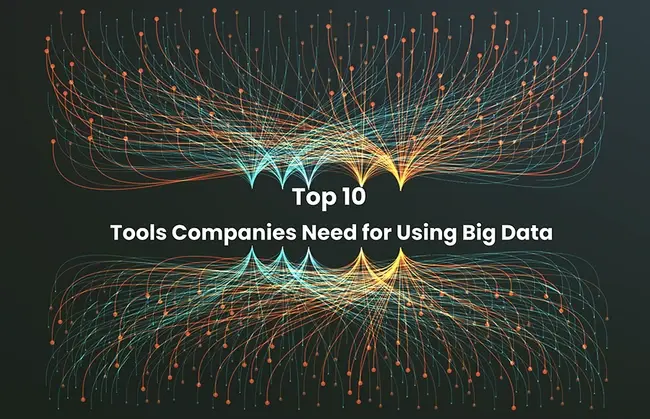
By 2020, estimates suggest that every person on earth will create 1.7MB of data per second.
That's a lot of information to process.
On the one hand, big data is a game changer for many organisations, providing access to insights that we could never have unlocked in the past. On the other hand, it's impossible to leverage that information without the right tools. To make the most out of any big data strategy, it's crucial for companies to have access to innovative solutions for managing, mining, and also understanding data.
Fortunately, there are plenty of developers out there creating the software we need to traverse the data landscape. In light of this, we've put together a list of ten must-have tools for any data dynamo.
Apache Spark
Finally, Apache Spark, used by companies like Databricks, is one of the most exciting tools in the industry for companies using big data. This open-source tool fills the gaps in your Hadoop solution when it comes to data processing, handling both real-time, and batch data. Spark is excellent at processing data much more quickly than traditional tools, which is excellent for data analysts. Ideal for companies already using Apache solutions like Cassandra or Flink, Spark makes the core of your data processing project more efficient and valuable, facilitating things like scheduling and also distributed task transmission. Features include:
- High-speed workloads
- Easy to use functionality
- Access real-time and batch data processing
- Run Spark on Hadoop, Kubernetes, standalone or also in the cloud
Apache Flink
Another solution in the comprehensive Apache portfolio, Flink is an open-source framework used by the likes of Ververica. With Flink, businesses can access a distributed engine of stream processing for computing their data in unbounded or bounded environments. Furthermore, a great thing about this tool is that it runs in all of the cluster environments you can think of, including Hadoop YARN, Kubernetes and Apache Mesos. Flink features also include:
- Access to useful APIs at several levels of abstraction
- Flexible windowing available
- Support a variety of third-party connectors
- Fault tolerant performance and failure recovery
Apache Cassandra
Endorsed by market leaders like Datastax, Apache Cassandra is a distributed database that businesses can use to manage a large range of data sets across multiple servers. As one of the best big-data tools for managing structured data, Cassandra offers a highly available service without any single point of failure.
Cassandra is an excellent choice when you need high availability and scalability without compromising on performance. Cassandra also supports replicating across multiple data centres, therefore offering lower latency for users. Features include:
- Fault tolerant data management
- No single points of failure for better peace of mind
- Scalable high-availability data management
- Choose between asynchronous and synchronous replication
- Third-party services available
Cloudera
Cloudera advertises itself as "the" enterprise data cloud company. Designed to give you more control over your data, Cloudera ensures that you can collect and process information from the Edge, all the way to your machine learning applications.
Cloudera also provides companies with the tools that they need to ingest, analyse, and curate real-time streaming data with Cloudera Dataflow. As well as this, there is the option to bring your data together from various different sources with Data warehousing. Features include:
- Collect and analyse data from multiple streams
- Manage and transform your information with the Cloudera data warehouse
- Build, deploy, and also scale machine learning solutions
- Collect and process data from the Edge
- Access real-time insights
Apache Kafka
Endorsed by Confluent, Kafka is the big data tool by Apache that processes and manages data in real-time. Durable, fault-tolerant, and also scalable, Kafka was initially developed by LinkedIn to help them overcome their batch processing problems. The Kafka platform processes incoming data streams regardless of their destination or source.
With Kafka, companies can process countless events every day. Additionally, LinkedIn reported that their Kafka system managed about 1 trillion events each day. Features include:
- Manage record streams
- Process streams of data as they occur
- Store information in a durable, fault-tolerant way
- Access core APIs to extend Kafka capabilities
Tensorflow
One of the best-known open source machine learning libraries in the world, Tensorflow is the Google-supported entry point to AI. As an end-to-end open source platform, Tensorflow makes transforming your data into the fuel for artificial intelligence easy. As well as this, the comprehensive ecosystem of community resources, libraries, and tools let researchers and developers create state-of-the-art ML applications.
Furthermore, with Tensorflow, companies can find simple solutions to ML problems, with easy model building functionality, and also powerful experimentation options. Features also include:
- Simple and flexible open source architecture
- State-of-the-art models for machine learning
- Easy model building
- Robust ML product on-premise, in the cloud, or also on device
- Range of resources and community support
Flume
Designed by the Apache group, Flume is a reliable, distributed, and highly engaging service for collecting and aggregating large amounts of data. With a flexible and simple architecture, Apache Flume is incredibly dependable and fault tolerant, although it might not seem like the most advanced tool on the market at first glance.
Flume is the Hadoop tool that developers can use to collect and transfer data streams from a variety of sources to a centralised environment. Flume is also very good at managing a steady flow of data between a wide variety of systems. Features include:
- Align data streams from a range of different resources
- Access a highly fault-tolerant and reliable mechanism for failover
- Collect data in both stream and batch modes
- Combine social media, sensor information, application logs and more
- Store all of your data in a central space
Tableau
Considered by many to be the holy grail of information management, Tableau allows companies to access the real power of their big data. Immersive and easy to use, Tableau is available for teams and organisations, as well as individual analysts. You can also use Tableau to embed analytics features into your existing tools and processes.
As one of the most secure and flexible end-to-end platforms for business data, Tableau takes your business information to the next level. You can securely check information on your mobile or desktop, access content discovery features, and also conduct in-depth analytics. Features include:
- Ask and answer questions about your data
- Extend your analytics functionality with APIs
- Get your data ready for analysis with a visual interface
- Make sure your information is secure with powerful permissioning and governance
- Connect all of your data in the cloud or on-premise
QlikView (Qlik)
Qlik is a platform designed to turn limitless data into easy-to-access information with unlimited possibilities. No matter how significant your data sources may be, you can combine everything into a single view, thus bringing more clarity to chaotic details.
QlikView is the classics analytics solution built on Qlik's Associative Engine. You can use it to explore your data, and also to access smart insights through augmented intelligence. Additionally, Multi-cloud architectures are supported to deliver results for a range of use cases. Features include:
- Guided analytics and governed self-service analytics
- Augmented intelligence available
- Modern broad data connectivity
- Explore without boundaries with smart visualisation
- Unlock massive data scaling
ElasticSearch
Finding and tracking data is crucial to managing it. ElasticSearch is one of the most powerful search engines on the market today. As a distributed and RESTful analytics engine, this solution helps companies to centrally store data, thus offering easier information control. You can also set up reliable search functionalities including autocompleted supported search, fuzzy search, and full-text search.
ElasticSearch also works on multi-tenant systems, therefore making it a cost-effective solution for companies working on multiple installations of the same master system. Features include:
- Query: Conduct structured, unstructured, metric, and also geo searches to discover insights.
- Analyse: Zoom out and look at the big picture to explore trends in your data.
- Speed: ElasticSearch offers incredible speed for any business.
- Scalability: Run on your laptop, or across hundreds of servers.














Comments ( 0 )